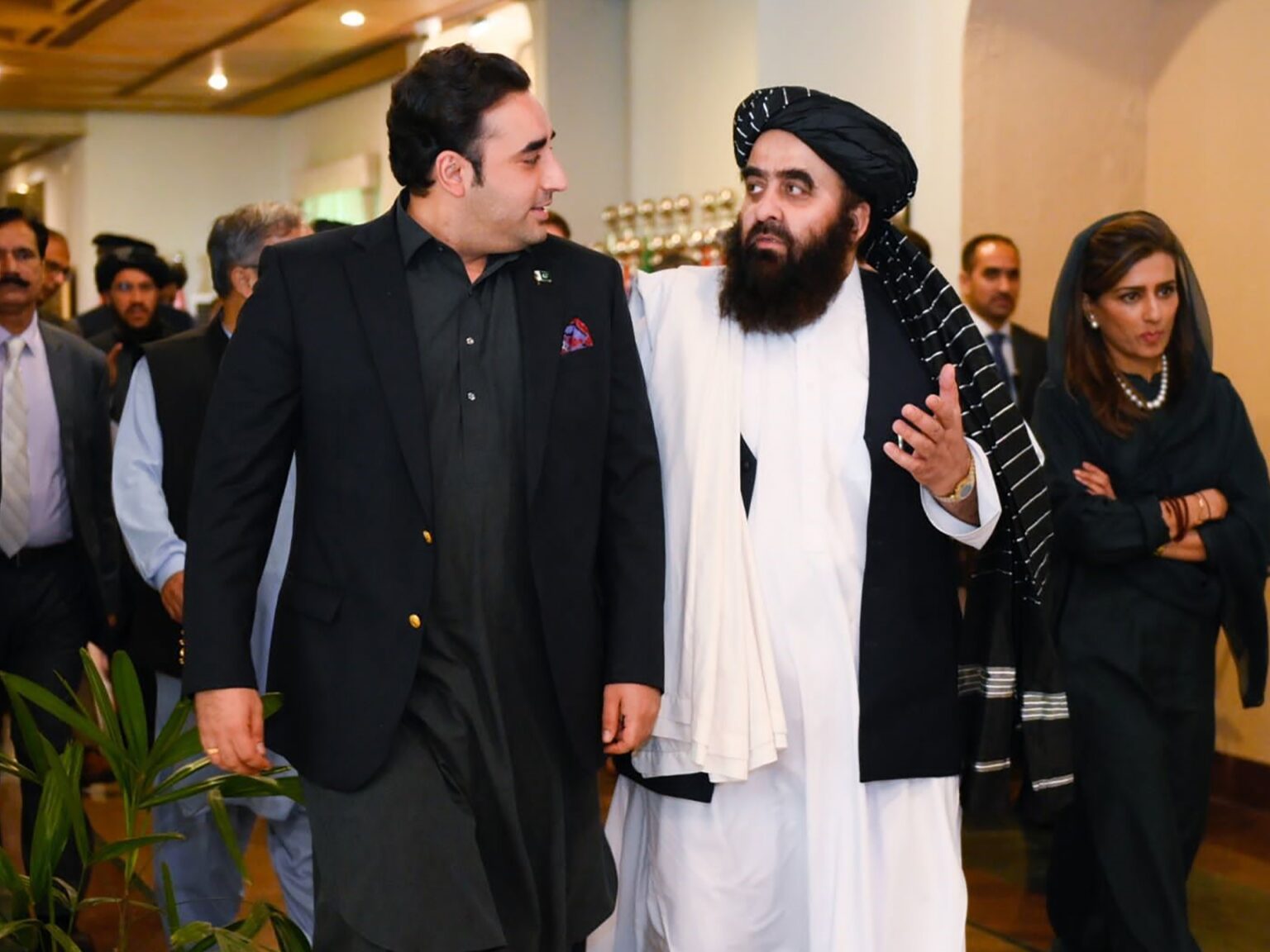Global Courant 2023-05-08 13:02:25
The Pakistani and Afghan Taliban governments have agreed to boost trade and ease tensions along their border amid a spate of attacks on Pakistani security forces, officials said.
Pakistani Foreign Minister Bilawal Bhutto Zardari and Taliban-appointed Afghan Foreign Minister Amir Khan Muttaqi agreed on the deal in Islamabad on Sunday, the Pakistani Foreign Ministry said.
The agreement aims to improve bilateral trade, fight “terrorism” and strengthen bilateral ties.
Bhutto Zardari and Muttaqi held a “candid and in-depth exchange of views on important issues of mutual concern, including peace and security, as well as trade and connectivity,” according to a statement released by the Pakistani Foreign Ministry on Sunday.
The two sides “reaffirmed their desire to pursue continuous and hands-on engagement,” it said.
Chinese Foreign Minister Qin Gang, left, his Pakistani counterpart Bilawal Bhutto Zardari, center, and Afghanistan’s acting foreign minister Amir Khan Muttaqi, after their meeting in Islamabad (Pakistan Information Department via AFP)
According to the Afghan embassy, Muttaqi and his delegation met with Bhutto Zardari and other officials. “At the meeting, matters of mutual interest, the political, economic and transit relations between Afghan-Pak and the challenges of Afghan refugees in Pakistan were discussed,” it said on Twitter early Monday.
The Pakistani military said Muttaqi also met with General Asim Munir, the army chief, to “discuss issues of mutual interest, including aspects related to regional security, border management and formalization of bilateral security mechanisms for improving the current security environment”.
Munir sought closer cooperation to “effectively address the common challenges of terrorism and extremism,” the statement said.
Afghan Acting Foreign Minister Amir Khan Muttaqi, left, with Pakistan Army Chief General Asim Munir, in Rawalpindi, Pakistan (Inter Services Public Relations via AP)
Relations between Pakistan and Afghanistan have had ups and downs over the past year.
In February, the two sides closed the main Afghan-Pakistani border crossing at Torkham, stranding people and trucks carrying food and essential items. After a Pakistani delegation traveled to Kabul for crisis talks, the border reopened after a week and Muttaqi’s visit to Islamabad was on the agenda.
The Taliban government of Afghanistan is shunned by most of the international community because of the harsh and restrictive measures they have imposed since taking power in August 2021, when US and NATO forces withdrew from the country in the final weeks of their withdrawal. land after 20 years of war.
The Taliban have banned girls from education after sixth grade and excluded women from most jobs and public life.
Pakistan has recently expressed concern over a spate of deadly attacks across the country by the Pakistani Taliban – an independent armed group affiliated with and reportedly protected by the Taliban in Afghanistan.
Islamabad has demanded the Taliban in Kabul do more to rein in anti-Pakistani groups, such as the Pakistani Taliban – also known as TTP – who have stepped up attacks on Pakistani security forces in recent months.
Saad Muhammad, a former Pakistani military attache in Kabul and defense analyst, told Al Jazeera he hoped for a “positive outcome” and Pakistan’s concerns will be taken up by the Taliban government.
“When Pakistan sent a high-level delegation in February, we saw a drop in violent attacks from Afghan soil, which showed that the Afghan government was taking action,” he said.
“If Afghanistan wants other countries to invest and help improve its socio-economic conditions, it should take these suggestions and implement some reforms in their governance.”
Earlier on Sunday, Bhutto Zardari and Muttaqi also had talks with Chinese Foreign Minister Qin Gang, a departure from recent years when such dialogue had been suspended, according to analysts who say Beijing is expanding its influence in the region.
China has also played a role in resuming diplomatic relations between Saudi Arabia and Iran.
In Pakistan, Beijing is funding the so-called China-Pakistan Economic Corridor (CPEC) – a vast package that includes projects such as building roads and power stations and boosting agricultural production.
The package is considered a lifeline for the Muslim-majority nation, which is currently facing one of its worst economic crises amid stalled bailout talks with the International Monetary Fund.
CPEC, also known as the One Road Project, is part of China’s Belt and Road Initiative, a global venture aimed at restoring the ancient Silk Road and connecting China to all corners of Asia.
Qin arrived in Islamabad on Friday and met President Arif Alvi, Bhutto Zardari and powerful army chief General Munir.
During these meetings, he was assured that Pakistan will increase security for all Chinese nationals working on multi-billion dollar projects in impoverished Pakistan.
China has been demanding greater security from Pakistan for its nationals living and working in the Islamic country since 2021, when a suicide bomber killed nine Chinese and four Pakistanis in an attack in the volatile northwest.
Defense analyst Muhammad told Al Jazeera that China also stressed at the meeting that regional countries’ concerns are justified and that the Taliban must act to protect the interests of its neighbors.
“But the world must also realize that leaving Afghanistan is not a solution. It is imperative to keep them involved and push them to make the necessary reforms,” he said.
(TagsToTranslate)News







